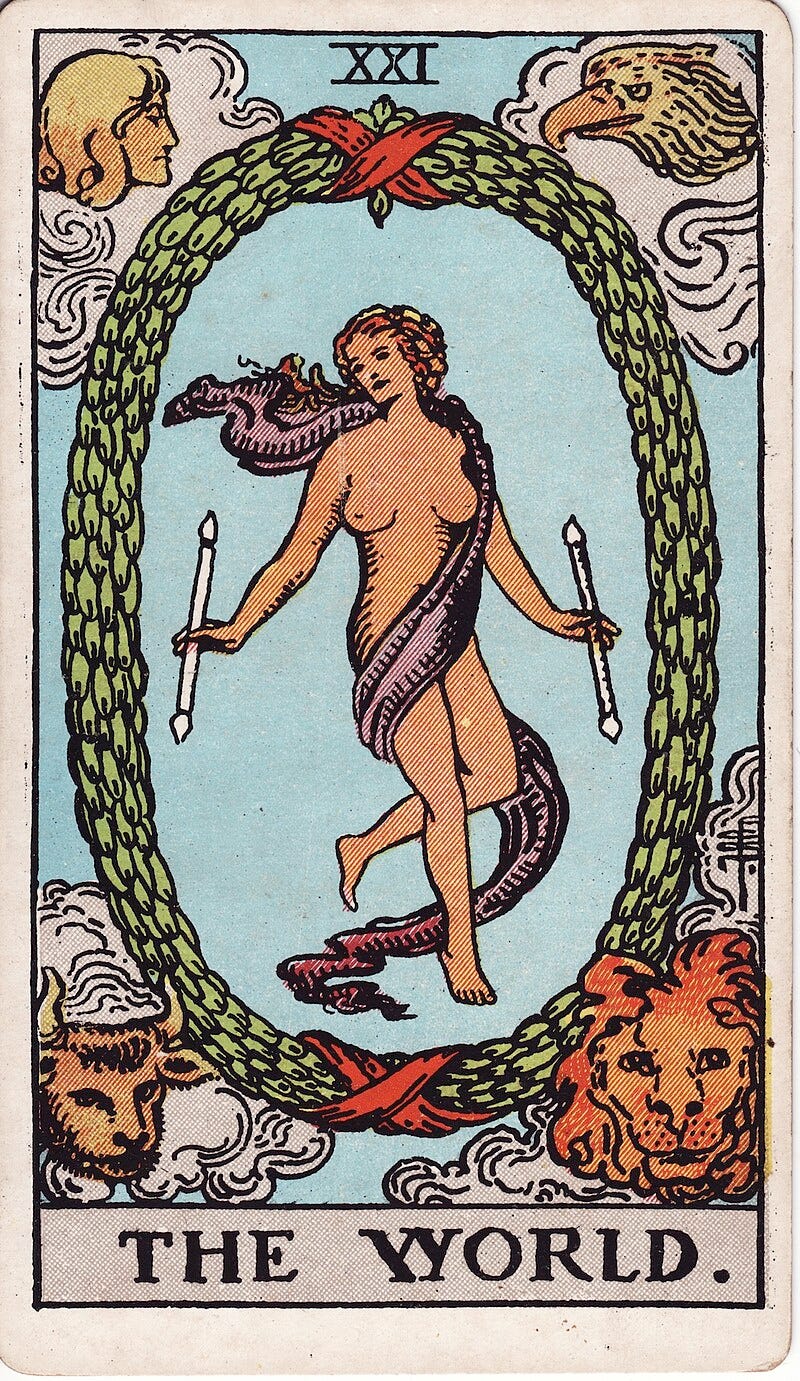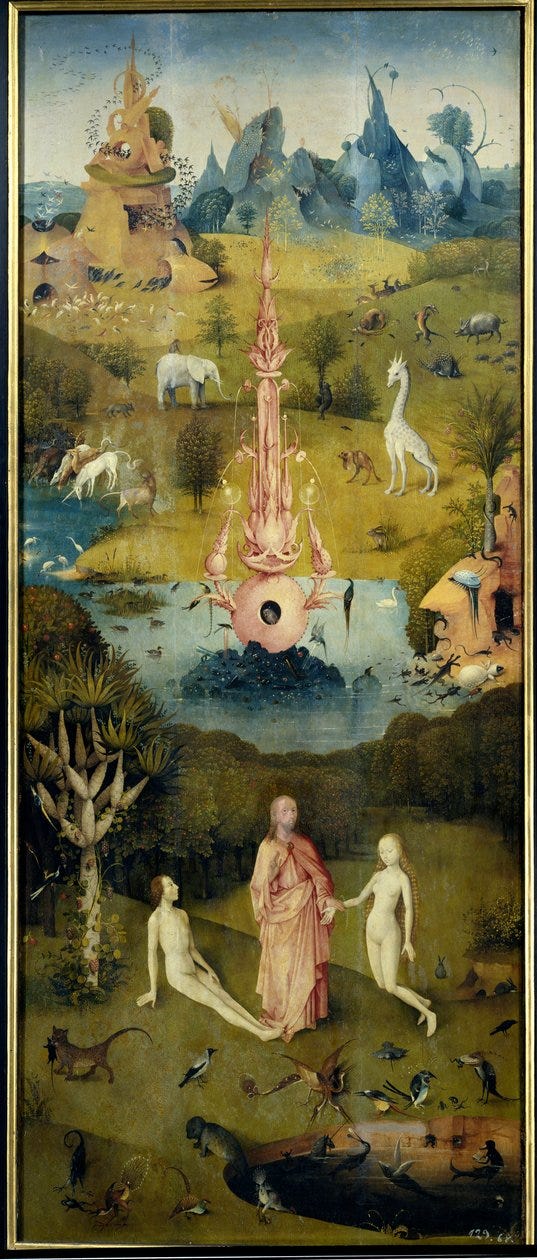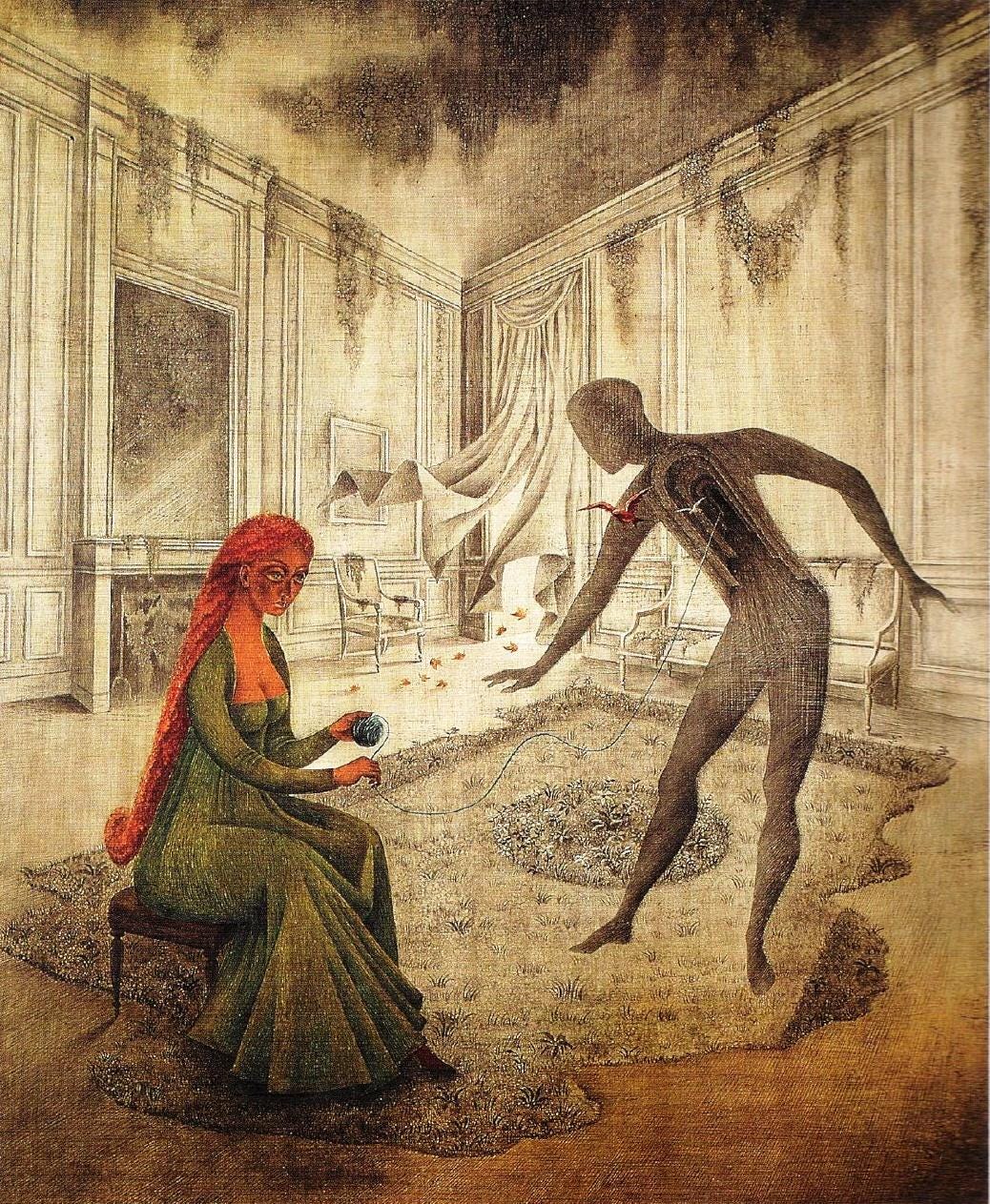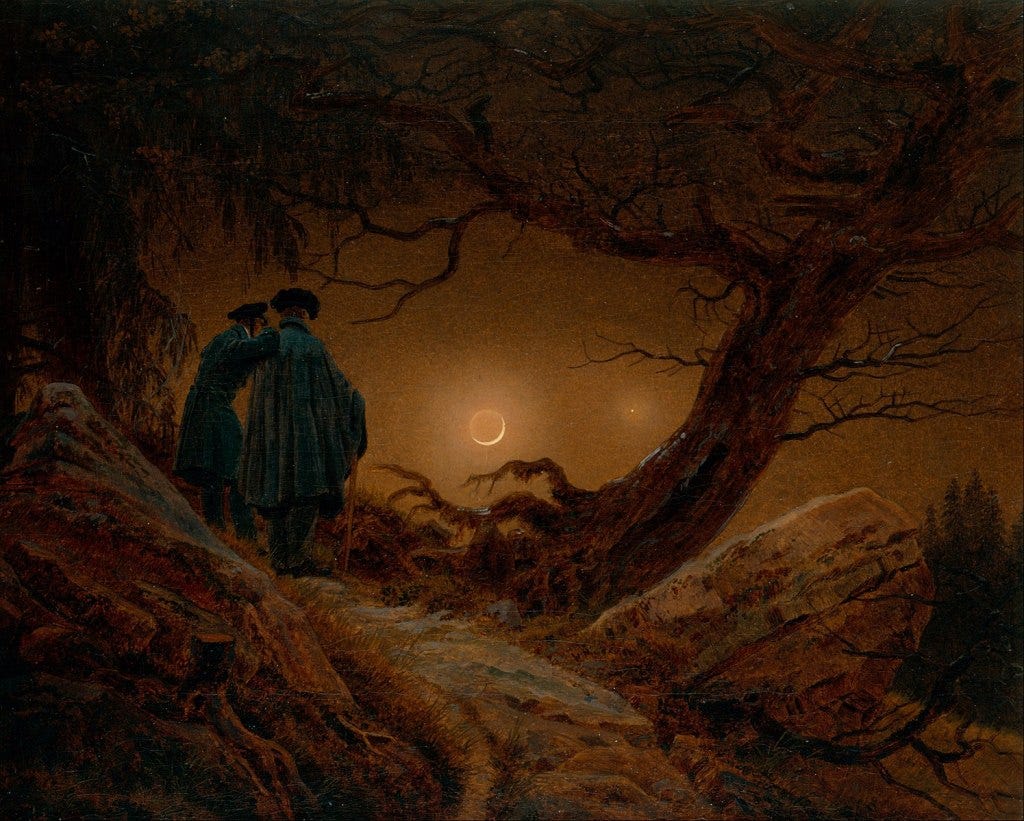Gravity's Rainbow - Part 4 - Chapter 9: The Dark Side of the Moon
Analysis of Gravity's Rainbow, Part 4 - Chapter 9: Geli Tripping Seeks Tchitcherine, Pagan Rituals, Genesis of Man's Thought, Blicero Lectures Gottfried
Geli Tripping has not been seen for a while. We first met her when Slothrop initially arrived in the Zone (3.1) after leaving Zürich (2.7). After he disembarked the train on which he first met Major Marvy and Enzian, he met Geli Tripping in Nordhausen, entranced by her singing out of a window. Slothrop spent the night with her, hearing about her lover, Vaslav Tchitcherine, being attacked by Tchitcherine’s owl, and learning a few clues about his quest. Geli was the first to tell Slothrop about the Schwarzgerät in detail, and how Tchitcherine was also on this Holy Grail-like quest. She even mentioned “‘A man in Swinemünde’” (3.1, pg. 294) — Gerhardt von Göll, also known as der Springer — who could potentially procure this device for him. The next day, Geli led Slothrop to the Mittelwerke, even giving him a pair of Tchitcherine’s old boots since he had lost his own (3.2). Finally, after Slothrop had escaped the Mittelwerke, he returned to Geli. She took him to view the Brocken Specter atop the mountains of Nordhausen, spoke to him more about Tchitcherine and the Schwarzkommando, revealed some of her witch-like qualities, and eventually took him to the hot air balloon where he would make his escape to Berlin (3.4).
Now, after the war has ended, she is still here, waiting for Tchitcherine. However, instead of passively waiting, she has taken it upon herself to find him by any means necessary. Geli carries around pieces of him along with various symbols and ingredients for a pagan ritual. There are others looking for him too: “a good few hundred of these young women in the Zone who’re smitten with love for Tchitcherine” but “none are witches” (717-718). These other young women who are trying to find Tchitcherine are doing so by more standard means, similar to how the average person would fight against a certain ‘system.’ Geli, however, thinks outside the box. She goes to a farmhouse, still holding these articles of Tchitcherine’s person: “toenail clippings, a graying hair, a piece of bedsheet with a trace of his sperm” (717) along with other objects such as rye bread baked from rye that she rolled naked in.1 Here, she finds a woman who will help call out to him with these unorthodox, pagan means.
Geli recalls how the Schwarzkommando departed from the mountains of Nordhausen in a Biblical Exodus, Nordhausen only being kept in the mind of the world through the Mittelwerke and Dora, which now were closed, and by the Zone Herero themselves. She predicts that the Schwarzkommando, and thus Enzian, will soon come in contact with Tchitcherine: a meeting we, Tchitcherine, and Enzian have been waiting for for some time now. Geli cannot bear to fathom that Enzian will see him again while she may have “felt his scarred and historied hands, for the last time” (718). Nonetheless, the loss of Nordhausen’s soul affects her similarly. With the mythology of it gone, both the good and bad — Tchitcherine, the Mittelwerke, and the Schwarzkommando — it is now ripe for becoming “just another capital, where the only enterprise is administrating” and where you would only come to “with a bureaucratic career in mind” (718). For, that is Their goal, whether it be taking Slothrop out for good or removing the Plechazunga rituals from Wismar: They desire to remove anything intangible and create a world of false tangibility — one in which numbers would rise and fall to apparently knowable forces, but that in reality were as intangible as the spirits that once readily hovered across the lands.
“Here is the World” (719). The World is the final major arcana in the Tarot. The card represents fulfillment, combination, conclusion, and unification. It is the merging of the male and female, the duality of symbols both good and evil, and a sense of ending. While there are many types of witches, “Geli is the World-choosing sort” (718). She embodies the arcana, travelling around wearing masculine clothing, attempting to find some sort of fulfillment and conclusion by discovering what happened to Tchitcherine. But she also knows that he may be gone, hearing false rumors about how he has died or has taken on twelve disciples, and true stories about his arrival at Lüneburg and how N. (Nikolai) Ripov has been planning to purge him.2
As The World, Geli sees dualistic symbols and meanings all across the Raketen-Stadt, specifically seeing one man, an engineer apart of “an army surveying party […] restoring a damaged road,” (719) naturally and likely subconsciously produce the sign of a cross with his hands as a symbol to her. Geli, being not only The World but also the unorthodox paganist, reads this cross not as a symbol of Christianity, but as a mandala, perhaps of the Herero sort or even the crossroads which Slothrop became. Given its inherent paganism and its embodiment of duality by being a symbol of The World, it urges her onward to find Tchitcherine by breaking the normal tradition. So, she pursues images and symbols, following “an eagle flying across the marshes” (720) which eventually leads her to a vision of creation. This vision is begun by the God Pan, a paganist and Satanic symbol in this part of the world. It is a vision of creation, the Genesis of man’s own consciousness.
The vision begins with a world just born: “canyons are opening up, at the bottoms are steaming fumaroles, steaming the tropical life there like greens in a pot” (720). Tectonic plates in the earliest years of our Earth shifted, opening trenches, spewing the Earth’s inner fire up into the atmosphere, providing the building blocks and necessities for the first cellular life to arise from apparent nothingness. But as millions and then billions of years pass on, “human consciousness, that poor cripple, that deformed and doomed thing, is about to be born” (720). How could man perceive the Earth as anything but these ‘steaming fumaroles’ or as “still strata, transputrefied to oil or coal” (720). Man’s senses and thus its base consciousness could only perceive the tangible facets around it. Of course, spirituality came into existence, but only ever to explain the tangible and the self. If Earth itself were believed to be more, if it were believed to be as Alive as us ostensibly singularly conscious beings, would that not ruin our very purpose, destroying our ego entirely and making us as dead and transputrefied as the Earth’s waste itself? This is why we disposed of the Titans and created monarchs in their stead. It is why men and children “were sent out to multiply, to have dominion” (720). And eventually, as ages passed, and feudalism evolved into capitalism, as capitalism evolved into fascism via the realms of synthesis and control, the ‘Counter-revolutionaries arose’: a new breed whose mission it was “to promote death” (720). For, revolution would mean that the world we have built to separate us from the natural spirit of Earth itself was false, and that all we ever have been was dead, though conscious, matter ourselves. If our place on Earth was to elevate the human spirit alongside the Earth’s spirit, then that would render us as nothing more important than the fumaroles, the shifting tectonic plates, the steam giving heat to the cells of new life. And we certainly couldn’t have that. It would be an existential crisis in the making. Instead, we must “[hold] down the green uprising” (720) — become something far more important and Godlier than these soulless plants and animals.
But there are defectors, “A few [who] keep going over to the Titans every day” which leads them to see “the presences we are not supposed to be seeing—wind gods, hilltop gods, sunset gods” (720) — those spiritual beings of the Earth and creation which would render our purpose here meaningless. Or would it? Could the defectors merely be seeing something more beautiful than the attempt to elevate man over all other life, or the attempt to elevate some men over others? Before we can get clarity to any of these questions, Pan, as a serpent, departs, leaving us with a new vision that in its own way gives an indirect answer.
In this vision, Blicero once again comes into view, and to him, “there are no more differences between the worlds: they have become one for him” (721). These dualities do not exist in his eyes. The cross which Thanatz saw reflected in Blicero’s eyes (4.5, pg. 670), to Thanatz, represented Blicero’s need for control. But Blicero, while being very well aware of this need, saw it as all the inherent dualities the cross could bear. To him, it was not merely control, but religion, sacrifice, a crossroads. It was the soul of the Earth and humanity’s rise above that soul. For Blicero was well aware of his desire for control, synthesis, and power, but he also truly believed he was sacrificing himself to achieve something he was owed. He, like many of the modern ruling class or many who view their own race as superior, believed that the soul of the Earth had predestined his elevation above others, and that his power was a ‘burden’ he must bear. Margherita Erdmann and Miklos Thanatz held Blicero’s full self-imposed Right at bay, placing his reality in solid Earth, keeping him at least fractionally rational. But this reality has gone, and Gottfried is the one who largely pays the price, though he himself does not even know it.
Gottfried has fully accepted his place as Bilcero’s slave, similar to how the 175s sought the order of the concentration camp despite their liberation (4.5), how Bianca felt fulfilled by giving her body to men far older and more powerful than her (3.15), how Katje found it difficult to leave Blicero despite his torment (1.14), and even how Enzian still held love for the same man after all he had been through (3.3, 4.4, and others). Blicero, and numerous other embodiments of power and control, give a sense of place to those they subjugate. They have perfected the means of creating a sense of learned helplessness and a need for an order imposed by a structure above oneself. It is similar to what Pointsman was attempting to achieve with Slothrop and his dogs, a conditioning to accept one’s subjugated place in society below those in charge — and more than an acceptance even, a desire. This is why Gottfried, even more tortured now than Katje or Enzian were, cannot fathom Blicero’s death. Gottfried believes that Blicero lives for him, that he truly loves Gottfried for more than just his willingness to be enslaved. Similarly, many of the Preterite have been conditioned to view the ruling class and the governmental power in that exact light: a refusal to see beyond those minor forms of comfort that they provide while hiding away what we could truly be instead. They hide away the Soul of the natural Earth and the Soul of the Preterite, only allowing us to see the society they have built in which man took dominion over the universe.
Like Geli, like Blicero even to some extent, Gottfried is also The World. His body and mind possess dualities: a masculine commanding father and a loving quiet mother, his own masculine genitalia and his desire to be penetrated, his crossdressing and the crossdressing of his lover, his own desire for something more (perhaps freedom) and a desire fighting against that one, asking to be controlled.
Blicero begins to lecture Gottfried, telling him that his life’s work was “discovering the edge of the World. Finding that there is an end” (722). It could be the very reason he launched his 00000 rocket Northward into what the Counterforce, at the Gross Suckling Conference, deemed to be the unknowable lands or the lands of the dead. His thoughts on what this unknown realm would be is that it was America. No, America is technically not North of the Heath, but symbolically, his launching of an object that was meant to represent the amalgamation of synthesis, death, and control would eventually be fully achieved in America via the intelligence networks that were in their infantile stages during the war and that would be advanced afterward. This idea is furthered in that Blicero, or the idea of him, a German Nazi, would also travel ‘Northward’ and set himself up in the American heartland where he could more easily, with all the protection he needed, complete his plot.
Before America became any bit of the powerhouse it was in WWII and post-WWII, Europe notoriously, through its never-ending imperialist project, “established its order of Analysis and Death” among “Africa, Asia, Amerindia, [and] Oceania” (722). These continents were playgrounds for Europeans, because “Christian Europe was always death, […] death and repression. Out and down in the colonies, life can be indulged […] with no harm done to the Metropolis” (3.3, pg. 317). Europe existed to spread its empire and amass its wealth, and the colonies, while being a part of this project, were also Europe’s playground. But America, well, “It has learned empire from its old metropolis” (722) and it has learned from its mistakes. America asked, what if we could have empire and play in our own home? What if we did not need to travel out to the colonies to fulfill our lust and gluttony, but instead, used those ‘dusky natives’ to produce our wealth over there, send it back home, and thus give us enough power to hide away our sin? America, as the rest of the Western capitalist world would follow, could forget its colonies even existed and yet still reap the rewards.
This project was the next step, but what if there was one further? Ilse envisioned it years ago when she asked Pökler if they could use one of his rockets to reach the moon, to live happily ever after (3.11). Blicero’s view — a view made possible through Pökler’s help — was different. He asked, “‘Will our new Edge, our new Deathkingdom, be the Moon?’” (723). It is a prediction of the coming age of technology and science — where all the colonies will have been colonized, and the lust of Empire will not be sated. The moon, thus, is the clear next step of Empire. A new land to plunder, to set up shop, and use as yet another playground for the Elite. No, there are no ‘dusky natives’ as far as we know, but there would also be no Preterite class able to revolt. A land free from consequence. While this may seem fantastical, it is not just a commentary on a literal journey to the moon3, but as a utilization of technology and science to further the Fascist imperialist project, raising the Elite class to new ‘unreachable’ heights which their underlings could never fathom, let alone grasp. And of course, these realms of science will be sent over to America from Europe, as previously mentioned, through something more modernly know as Operation Paperclip.
It seems ridiculous that someone could persuade the Preterite of such an insane proposition. However, as we see Blicero do, he preys on the pathos of the young, the innocent, the hopeful. He tells Gottfried, as They tell us, “‘you are beautiful to me,’” (723) to make us believe that They love us. And maybe they do, in some sick, twisted way, mistaking that fulfilled feeling of control they have over us for love: “‘when I see you in morning and evening ranks, so open, so ready to take my sickness in and shelter it, shelter it inside your own little ignorant love’” (723). And Gottfried believes; we have often believed. Gottfried kneels in front of him, his loving, willing, servant. And Blicero continues the show (or again, maybe his love and his pleading are real to him, however perverse they may be). Blicero asks Gottfried to fully submit to the plan, a plan we still do not know. It ends with us waiting for Gottfried’s answer.
Whatever the plan is includes the Schwarzgerät, the 00000, Imipolex G, and Gottfried. We know the plan went through, and yet Gottfried’s final submission or refusal is unknown. Geli, who witnessed this all through a vision beginning with the birth of the world and of human thought, does not know either. She is The World and witnesses the dualities of existence, the truths told, and the lies hidden away, the masculine and feminine, the tales of the Moon as adventure and of conquest, tales of subservience and control — all as she searches for her own love who seeks those same unanswerable conclusions.
Up Next: Part 4, Chapter 10
This bread will come back in later chapters.
Nikoloai Ripov was the CIA man (the Commissariat for Intelligence Activities) who was sent to get Tcitcherine reassigned once again in order to prevent his further delving into things he should not know (4.7).
Though, now that we have people like Elon Musk, it seems like it also is a prediction of that.







This chapter kicked my ass, read both this analysis and it twice. The ideas of humanity, moreso the elite, working to separate themselves from nature is eerily new to me. I've observed it in the behavior or billionaires but never quite put it together that at the end of the day, they just want to be immortal. Expressing it through a dense mythos-synopsis (a la Pan, Titans, life vs. death) didn't make it any easier to swallow. There is a beauty there I sense but can't see or fully appreciate (common feeling for me throughout GR) which drives me to dig in more.
"still strata, transputrefied to oil or coal” (720) - the idea man can only perceive & interact with 'tangible facets' reminds me of how machine learning feature engineering is done. As far as I'm educated (CS by degree, data scientist by trade) we engineer and create features to feed into our large neural networks and then they do their magic of learning from there. There is work on automatic feature engineering, but I believe the most successful systems still need expert guidance for selection and state-of-the-art performance.
For example, take a person's features. Age, Height, Sex, Gender, Sexual orientation, Nationality, Education, Shoe Size, Eye Color, Myers-Briggs Personality, IQ, Religion, Cock length, 100-meter dash time, Political alignment, Porn search history, # of relationships,
These are all things man's defined, they are not given to us from the Titans. Anytime you create a set of labels you are always reducing the entity to something less than it's whole. In an attempt to control it or perform some operation on it, like Blicero wants.
Is it possible, as they mature with enough computation and data, for these LLM's and eventually AGI's to tap into the Titan's and remind us of our original/true place in nature? Will we resurrect the dead gods? Or are they a permanent bifurcation in the evolutionary timeline, lost to a logical space. Our new gods, computational powerhouses, emulating the dirty biological processes enough to control us.
I'm not sure myself. I believe both can happen. As the creators of these new artificial beings we train and raise them. If the creators are imbued with the touch of the Titans, I believe that connection with death will come through. Yet, we'll also see AI's who only serve the interest of the elites, because they'll destroy and retrain until they do (like they attempt to do with the people).
In this perspective, it's another installment in the same War we've been fighting since the first monkey started collecting taxes and we left our Paleolithic origins. I think our conception(s) and relationship(s) with technology needs a major overhaul and could help us find a more beneficial path in this frightening future.
This chapter, and particularly your write-up of it, reminded me of a piece I read years ago, Sam Kriss's "Manifesto of the Committee to Abolish Outer Space" (https://thenewinquiry.com/manifesto-of-the-committee-to-abolish-outer-space/). Re-reading it now, it feels almost like a Preterite response to Blicero's lunacy. Kriss writes of Robert Zubrin's "The Case for Mars":
"It’s a strange and unnerving text. Despite the title, most of the work isn’t so much a case for Mars as a pedantic argument for the feasibility of Zubrin’s own Mars Direct program. Only in the final chapters does something like a reason why we should want to go to Mars emerge: Space colonization should be read as an exact analogue to Christopher Columbus’s pillage of the Americas. (Columbus is mentioned four times in the book, Marx only once; this is always a bad sign.) By opening up the Americas to settlement, Columbus created something new and unique called “Western humanist civilization.” Out of stifling feudal ignorance grew a society in which “human life and human rights are held precious beyond price,” a world of restless dynamism where scientific innovation is upheld and every effort is made to improve the quality of life for all."
Of course, the true reason for the colonization of the Americas wasn't humanism at all, but the simple fact that the Elite had become "unable to extract enough of a surplus from the restive peasants to reproduce their society." The Elite is facing a similar problem now, as the society They have engineered
"depends for its existence on the presence of a frontier, a blank homogeneous space to be settled and transformed by the desires and fantasies of an entrepreneurial libidinality, one whose open freedom can’t help but transform in turn those settled societies back East. The old frontier has been closed for a long time, and the results are clear to see: “the spread of irrationalism; the banalization of popular culture; the loss of willingness by individuals to take risks, to fend for themselves or think for themselves.” Our manly vigor has been sapped, but we can regain it if we take a new lover. We must inseminate Mars."
In many ways, Kriss is a very different writer from Pynchon. However, I think they share a similar ethos, and I really see that in this paragraph towards the end of the piece:
"We said earlier that for us to abolish something does not mean to destroy it. Once the cosmos was thought to be painted on the veil of the firmament, or to be some kind of divine metaphor, a flatness inscribed with thousands of meaningful stories. Since then it’s become outer space, a grotesque emptiness. Space is a site of desecration, an emptiness in which one moves, and moving into space means closing down any chances for Earth. C.A.O.S. is not interested in setting up limits. We want to create a future, not one of tin cans dodging rocks in a void, but a future for human life. To do this we must abolish outer space with all its death and idiocy, and return the cosmos to its proper domain, which is mythology, so that when we look up it will be in fear and wonder, and the knowledge that we live in a world that is not possible."
Anyway, if you made it through all this, just want to say thanks for doing this blog! It's greatly enhanced my enjoyment of this already quite-enjoyable novel. Now I just need to decide which Pynchon to read next (this is my first).